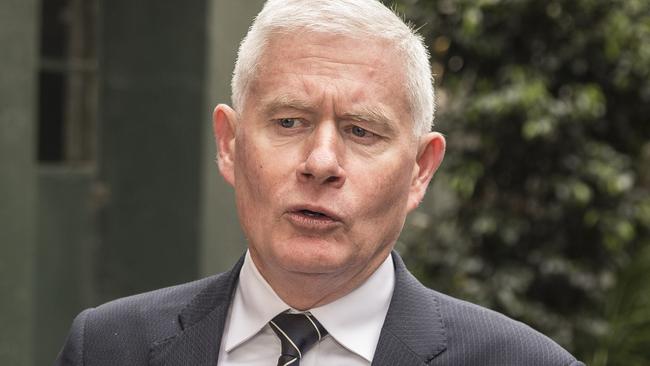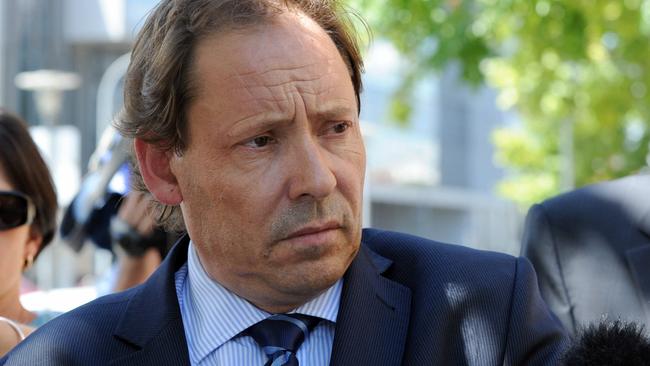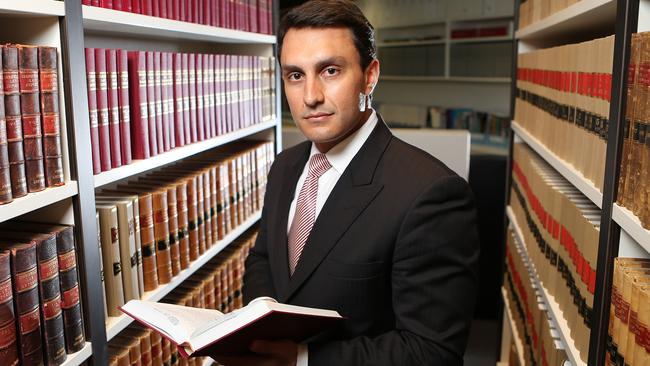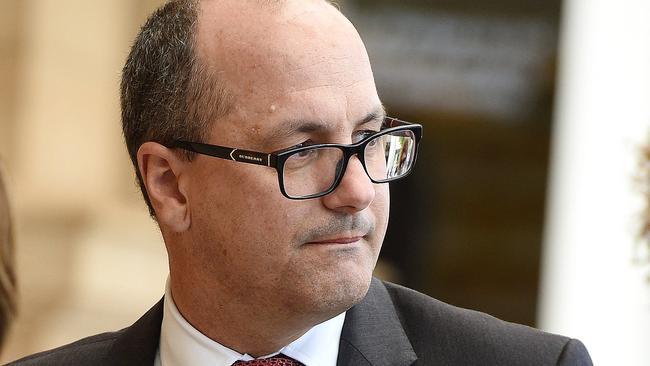Adelaide’s legal fraternity and Attorney-General John Rau are at loggerheads over far-reaching reforms to South Australia’s ailing justice system
ADELAIDE’S legal fraternity is at loggerheads with Attorney-General John Rau over far-reaching reforms to South Australia’s ailing justice system.
- Top barrister says proposed SA court reforms are unfair on defendants
- Victims face year-long wait for justice in SA’s District Court
THE magic pill to unclog the higher courts or a full-on assault on the fundamental rights of an accused person?
Once again, Adelaide’s legal fraternity and Attorney-General John Rau are at loggerheads. This time it’s over far-reaching reforms to South Australia’s ailing justice system.
They are at opposite ends of the spectrum over proposed amendments to legislation governing the way those charged with major indictable offences – serious matters that carry hefty prison sentences – are handled by the court system.
The amendments are driven by the desperate need to reduce the huge backlog of cases in the District Court and reduce the significant number of late guilty pleas – around 35 per cent of total cases last financial year – that create havoc with listing schedules and waste valuable resources.
The amendments include requirements for the provision of “case statements” by both sides, setting out the prosecution and defence cases, within six weeks of charges being laid and measures to severely limit the issuing of subpoenas by the defence to discover potential evidence that can assist them.

There is no doubt Mr Rau’s intent is pure. His aim is at fixing an almost broken wheel, not at those who need criminal cases to progress to make their living.
But there is also no doubt he has touched a tender nerve.
Prominent silk David Edwardson last month told an international law council conference the proposals directly affected the rights of an accused person, and would essentially help prosecutors and police convict them.
He says he has no issue with the defence defining issues in advance of a trial and even disclosing a defence, as long as the prosecution has made full disclosure and are committed to the prosecution case.
But he says the proposed Bill, unlike Victoria, does not have any provision under which the court can order the prosecution to make full disclosure.
It is fair to say Mr Edwardson’s spirited speech went down like a sharp chop bone, on North Terrace.
This stoush is not unprecedented. Mr Rau successfully managed to alienate a hefty portion of the legal fraternity with the recent changes to accident compensation.
Not only did that legislation reduce payouts for accident victims, but it also put a significant number of lawyers out of work and resulted in several smaller firms that specialised in crash injury claims closing down.

To put things in perspective, there is far more at stake with this legislation. While money – ie, reducing payouts – was at the heart of the compensation reforms, it is argued that this time an accused person’s liberty is potentially at stake with the some of the proposed trial reforms.
It is no coincidence both the SA Bar Association and the SA Law Society have reacted ferociously to many of the proposed measures. It states “the defining characteristics of the criminal justice system should not be subordinated or, indeed, abrogated, on account of concerns for efficiency’’.
Association president Ian Robertson, SC, says the direction the amendments take – if enacted in their current form – is “fundamentally incompatible with what should be considered basic and immutable rights and privileges of any member of the community who finds him or herself facing a criminal charge of any description.’’
He says a criminal trial cannot be considered a pursuit for the discovery of “truth’’; rather, its purpose is to place the parties in a position to present to a jury evidence and arguments which inform the question whether the prosecution has proved a criminal charge beyond reasonable doubt.
“It is indisputably contrary to the long history of the common law to require a person accused of a crime to assist or facilitate the prosecution in discharging that burden,’’ he states.
“Requiring an accused to disclose his or her defence in advance of a trial and depriving an accused of, or limiting access to, the forensic tools to obtain the evidence or information considered necessary to ensure that a person’s defence can be presented in a comprehensive and effective manner, achieve precisely that result.
“These proposals have a direct impact on the foundational precepts of the criminal law.
“Indeed, in the respectful view of the SABA, some of the proposals go a long way to undermining, if not eroding, the presumption of innocence.’’ Law Society of SA president David Caruso shares that view in some respects.

While his submission broadly supports the amendments, the society is opposed to provisions that severely limit the use of pre-trial subpoenas.
“Subpoenas should be available in the committal process so that full disclosure can be made during that process rather than waiting for committal to the District Court, which may slow the process,’’ he states.
“We note that subpoenas are usually only issued where there has been a failure to disclose relevant material to the defence.
“Members of the society have identified that, in many cases, the provision of documents under a subpoena issued pre-committal has ultimately led to either a withdrawal of the charges at any early stage, or the entry of an early guilty plea.’’
He states if there were concerns about subpoenas being used simply as “fishing expeditions’’ there was already the discretion available to the court to refuse leave to issue it.

Director of Public Prosecutions Adam Kimber, SC, says two key goals of the reform were improving the standard of briefs when they become the responsibility of his office and providing a framework “by which the true issues can be identified’’ in matters that must be listed for trial.
Within this framework, Mr Kimber believes it is important to recognise three factors. They were that similar procedures already exist in other jurisdictions, they only occur after a magistrate has found there is a case to answer and there was “nothing new’’ in prosecutors and defence counsel identifying true issues in a trial.’’
“It occurs in many matters already, but very late,’’ he said.
“In some instances, so late that it happens during the trial itself and after the time of witnesses has been wasted by coming to court only to be told they are no longer needed. This is wasteful and unnecessary.’’
Mr Rau said he had not yet considered all of the responses but he had met with several members of the criminal bar during the consultation period.
“It is fair to say some of their reactions don’t surprise me. That said, some I have found to be very encouraging,’’ he said.
“There is every reason to believe we can land on a spot where we can achieve fundamental change, not cosmetic change, and at the same time address some of the concerns that have been put forward.’’
He expected the legislation to be finalised by the end of November.
